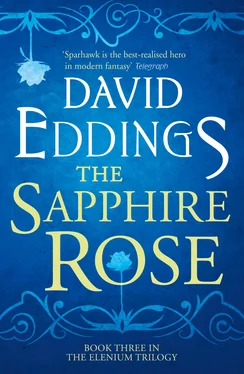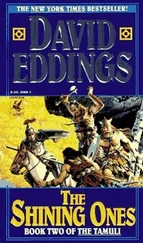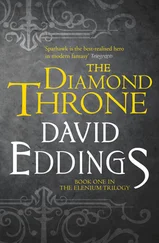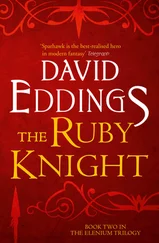DAVID EDDINGS
The Sapphire Rose
The Elenium
BOOK THREE

Harper Voyager An imprint of HarperCollins Publishers 1 London Bridge Street London SE1 9GF
www.harpervoyagerbooks.co.uk
This edition 1995
Previously published in paperback by Grafton 1992, reprinted once, and by HarperCollins Science Fiction & Fantasy 1993, reprinted twice
First published in Great Britain by Grafton 1991
Copyright © David Eddings 1991
Cover layout design © HarperCollins Publishers Ltd 2015 Cover images © Shutterstock.com
The Author asserts the moral right to be identified as the author of this work
All rights reserved under International and Pan-American Copyright Conventions. By payment of the required fees, you have been granted the nonexclusive, nontransferable right to access and read the text of this e-book on-screen. No part of this text may be reproduced, transmitted, downloaded, decompiled, reverse engineered, or stored in or introduced into any information storage and retrieval system, in any form or by any means, whether electronic or mechanical, now known or hereinafter invented, without the express written permission of HarperCollins e-books.
Source ISBN: 9780007127832
Ebook Edition © JUNE 2010 ISBN: 9780007375080
Version 2015-03-20
Cover
Title Page
Copyright
Map
Prologue
Part One: The Basilica
Chapter 1
Chapter 2
Chapter 3
Chapter 4
Chapter 5
Chapter 6
Chapter 7
Chapter 8
Chapter 9
Part Two: The Archprelate
Chapter 10
Chapter 11
Chapter 12
Chapter 13
Chapter 14
Chapter 15
Chapter 16
Chapter 17
Chapter 18
Part Three: Zemoch
Chapter 19
Chapter 20
Chapter 21
Chapter 22
Chapter 23
Chapter 24
Chapter 25
Chapter 26
Chapter 27
Chapter 28
Chapter 29
Chapter 30
Chapter 31
Epilogue
Author’s Note
About the Author
Also by the Author
About the Publisher
Otha and Azash – Excerpted from A Cursory History of Zemoch. Compiled by the History Department of the University of Borrata.
Following the invasion of the Elenic-speaking peoples from the steppes of central Daresia lying to the east, the Elenes gradually migrated westward to displace the thinly scattered Styrics who inhabited the Eosian continent. The tribes which settled in Zemoch were latecomers, and they were far less advanced than their cousins to the west. Their economy and social organization were simplistic, and their towns rude by comparison with the cities which were springing up in the emerging western kingdoms. The climate of Zemoch, moreover, was at best inhospitable, and life there existed at the subsistence level. The Church found little to attract her attention to so poor and unpleasant a region; and as a result, the rough chapels of Zemoch became largely unpastored and their simple congregations untended. Thus the Zemochs were obliged to take their religious impulses elsewhere. Since there were few Elene priests in the region to enforce the Church ban on consorting with the heathen Styrics, fraternization became common. As the simple Elene peasantry perceived that their Styric neighbours were able to reap significant benefits from the use of the arcane arts, it is perhaps only natural that apostasy became rampant. Whole Elenic villages in Zemoch were converted to Styric pantheism. Temples were openly erected in honour of this or that topical God, and the darker Styric cults flourished. Intermarriage between Elene and Styric became common, and by the end of the first millennium, Zemoch could no longer have been considered in any light to be a true Elenic nation. The centuries and the close contact with the Styrics had even so far corrupted the Elenic language in Zemoch that it was scarcely intelligible to western Elenes.
It was in the eleventh century that a youthful goatherd in the mountain village of Ganda in central Zemoch had a strange and ultimately earth-shaking experience. While searching in the hills for a straying goat, the lad, Otha by name, came across a hidden, vine-covered shrine which had been erected in antiquity by one of the numerous Styric cults. The shrine had been raised to a weathered idol which was at once grotesquely distorted and at the same time oddly compelling. As Otha rested from the rigours of his climb, he heard a hollow voice address him in the Styric tongue. ‘Who art thou, boy?’ the voice inquired.
‘My name is Otha,’ the lad replied haltingly, trying to remember his Styric.
‘And hast thou come to this place to pay obeisance to me, to fall down and worship me?’
‘No,’ Otha answered with uncharacteristic truthfulness. ‘What I’m really doing is trying to find one of my goats.’
There was a long pause. Then the hollow, chilling voice continued. ‘And what must I give thee to wring from thee thine obeisance and thy worship? None of thy kind hath attended my shrine for five thousand years, and I hunger for worship – and for souls.’
Otha was certain at this point that the voice was that of one of his fellow herders playing a prank on him, and he determined to turn the joke around. ‘Oh,’ he said in an offhand manner, ‘I’d like to be the king of the world, to live forever, to have a thousand ripe young girls willing to do whatever I wanted them to do, and a mountain of gold – and, oh yes, I want my goat back.’
‘And wilt thou give me thy soul in exchange for these things?’
Otha considered it. He had been scarcely aware of the fact that he had a soul, and so its loss would hardly inconvenience him. He reasoned, moreover, that if this were not, in fact, some juvenile goatherd prank, and if the offer were serious, failure to deliver even one of his impossible demands would invalidate the contract. ‘Oh, all right,’ he agreed with an indifferent shrug, ‘– but first I’d like to see my goat – just as an indication of good faith.’
‘Turn thee around then, Otha,’ the voice commanded, ‘and behold that which was lost.’
Otha turned, and sure enough, there stood the missing goat, idly chewing on a bush and looking curiously at him. Quickly he tethered her to the bush. At heart, Otha was a moderately vicious lad. He enjoyed inflicting pain on helpless creatures. He was given to cruel practical jokes, to petty theft, and, whenever it was safe, to a form of seduction of lonely shepherdesses that had only directness to commend it. He was avaricious and slovenly, and he had a grossly overestimated opinion of his own cleverness. His mind worked very fast as he tied his goat to the bush. If this obscure Styric divinity could deliver a lost goat upon demand, what else might He be capable of? Otha decided that this might very well be the opportunity of a lifetime. ‘All right,’ he said, feigning simple-mindedness, ‘one prayer – for now – in exchange for the goat. We can talk about souls and empires and wealth and immortality and women later. Show yourself. I’m not going to bow down to empty air. What’s your name, by the way? I’ll need to know that in order to frame a proper prayer.’
‘I am Azash, most powerful of the Elder Gods, and if thou wilt be my servant and lead others to worship me, I will grant thee far more than thou hast asked. I will exalt thee and give thee wealth beyond thine imagining. The fairest of maidens shall be thine. Thou shalt have life unending, and, moreover, power over the spirit world such as no man hath ever had. All I ask in return, Otha, is thy soul and the souls of those others thou wilt bring to me. My need and my loneliness are great, and my rewards unto thee shall be equally great. Look upon my face now, and tremble before me.’
Читать дальше













